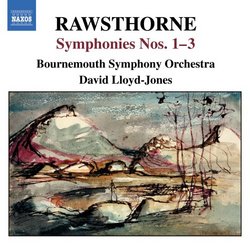| All Artists: Alan Rawsthorne, David Lloyd-Jones, Bournemouth Symphony Orchestra, Charlotte Ellet Title: Rawsthorne: Symphonies Nos. 1-3 Members Wishing: 0 Total Copies: 0 Label: Naxos Release Date: 2/22/2005 Genre: Classical Style: Symphonies Number of Discs: 1 SwapaCD Credits: 1 UPC: 747313248025 |
Search - Alan Rawsthorne, David Lloyd-Jones, Bournemouth Symphony Orchestra :: Rawsthorne: Symphonies Nos. 1-3
 | Alan Rawsthorne, David Lloyd-Jones, Bournemouth Symphony Orchestra Rawsthorne: Symphonies Nos. 1-3 Genre: Classical
|
Larger Image |
CD DetailsSimilar CDs
|
CD ReviewsRawsthorne Given Exemplary Performances J Scott Morrison | Middlebury VT, USA | 05/28/2005 (4 out of 5 stars) "The music of British composer Alan Rawsthorne (1905-1971) is not well-known in the United States. In a lifetime of concert-going I've never heard a single work of his performed. I've known some of his music from a well-regarded series of Lyrita recordings from the LP era, including a recording of the Second Symphony. And, of course, I've known his best-known piece, the 'Symphonic Studies.' More recently I had reviewed favorably a Naxos release of his piano concertos. Thus, I was eager to hear this CD of all three of his symphonies. I must say, however, that this is difficult music to get one's ears around, at least partly because of the tonal ambiguity of so much of it, particularly in the First and Third Symphonies (and perhaps some familiarity with the soft, more lyrical Second Symphony helped me 'hear' it more easily). Part of the problem is a kind of unrelenting grayness that comes from Rawsthorne's handling of harmony. Although nearly completely tonal, it is actually what I would call 'ambitonal' in that the tonal center keeps changing, sometimes within very few measures, largely because of the way he uses augmented triads with their conflicting sets of major thirds. First you think you're in F major then it suddenly becomes C sharp minor, then C sharp major, say. Confusing, but it does tease the ear. Another aspect of Rawsthorne's style is that he doesn't mess around with unnecessary passage work or standard development; rather he tends to progress by juxtapositions of unlike material. He plunges right in and carries one forward breathlessly, even in his slower movements. This is particularly so in the First Symphony, which is not only dramatic but even rather tumultuous. Still, once one gets attuned to Rawsthorne's harmonic and gestural fingerprints, this can be powerful and evocative music. I would suggest to anyone who buys this CD that they listen to only one movement or perhaps just one symphony at a time, and several times, before moving on to the next. Perhaps that's not a bad recipe for listening to any new music, but it is particularly helpful for music as hard to grasp initially as this. I've found with the two unfamiliar works that it helped immensely to concentrate on a movement at a time. Generally, by the third time around it has begun to sink in, make sense and evoke an emotional response.
These performances are unexceptionable. David Lloyd-Jones is a fine conductor, as his other recordings (Holst, Bax, Elgar, Vaughan Williams) attest, and of course the Bournemouth Symphony is a known, and valued, commodity. Soprano Charlotte Ellet, who sings the poetry of Henry Howard's evocation of the arrival of summer in the finale of the Second 'Pastoral' Symphony, has a bright, lyrical voice that imparts the joy of that event, while the orchestra underscores it with the darkness that both the poem and the composer apparently feel summer contains ('Each care decays, and yet my sorrow springs'). Scott Morrison" |

 Track Listings (12) - Disc #1
Track Listings (12) - Disc #1

